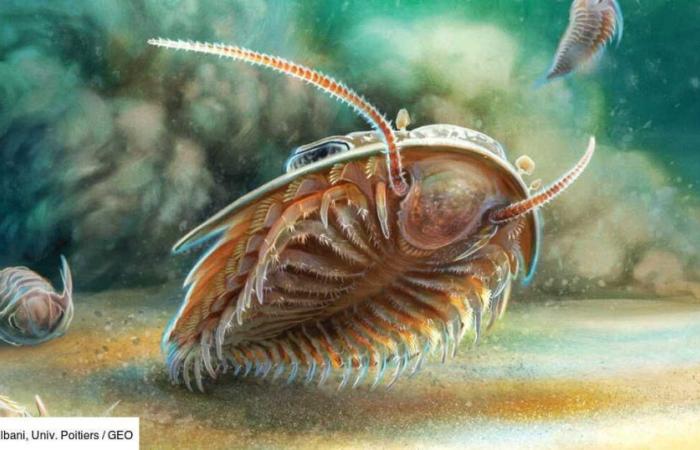Halfway between Marrakech and Agadir, in Aït Youb, a moment T of life, 515 million years ago, has been frozen for eternity. Petrified in volcanic ash, trilobites were discovered by a Franco-British team led by researchers from the University of Poitiers. In the animal family tree, these arthropods correspond to the branch that includes insects, crustaceans, spiders and millipedes.
These fossils are so exceptional that they made the front page of the prestigious magazine ScienceJune 27, 2024. And for good reason, this discovery was quickly described as “marine Pompeii”, with marine arthropods instead of humans.
A major scientific breakthrough
This discovery is prodigious in more than one way. Indeed, these invertebrates petrified in ash revealed many anatomical details on X-rays, unlike the millions of other specimens already discovered in the world that did not reach this level of precision. With this discovery, the trilobites of Aït Youb thus become the best preserved marine fossils ever discovered.
Read also: British scientists have unravelled the mysteries of a giant 13,000-year-old star dune in southeastern Morocco
On the side of scientists, emotion is strong. “I’ve been studying trilobites for almost 40 years, but I’ve never felt like I was looking at living animals like I did with these“, said Greg Edgecombe, curator at the Natural History Museum in London, arthropod specialist and co-author of the study, in a press release.
A window opens to the past
The level of precision of the details discovered allows us to better understand how this species fed. Indeed, during the volcanic eruption in which these specimens were buried, “The biological tissues were then consumed by the intense heat, leaving only cavities in the solidified ashes: the molds of the organisms,” explains the team of scientists from the University of Poitiers. However, it is these same molds which “preserve fine details of the trilobites’ outer surface, including hairs and spines along the appendages.”
Read also: Discovery in Morocco of Khinjaria acuta, the scariest marine predator
The study of these fossils thus reveals a digestive tract, which was also preserved after filling with ashes, but also a “grouping of pairs of specialized legs around the mouth”for the first time observed with such precision. Another great discovery, the presence of a labrum, “a fleshy lobe that acts as an upper lip in modern arthropods.”
“New windows should thus open onto the past of our planet,” glimpse Professor Abderrazak El Albani, teacher-researcher at the Institute of Chemistry of Media and Materials in Poitiers, who directed the work.






